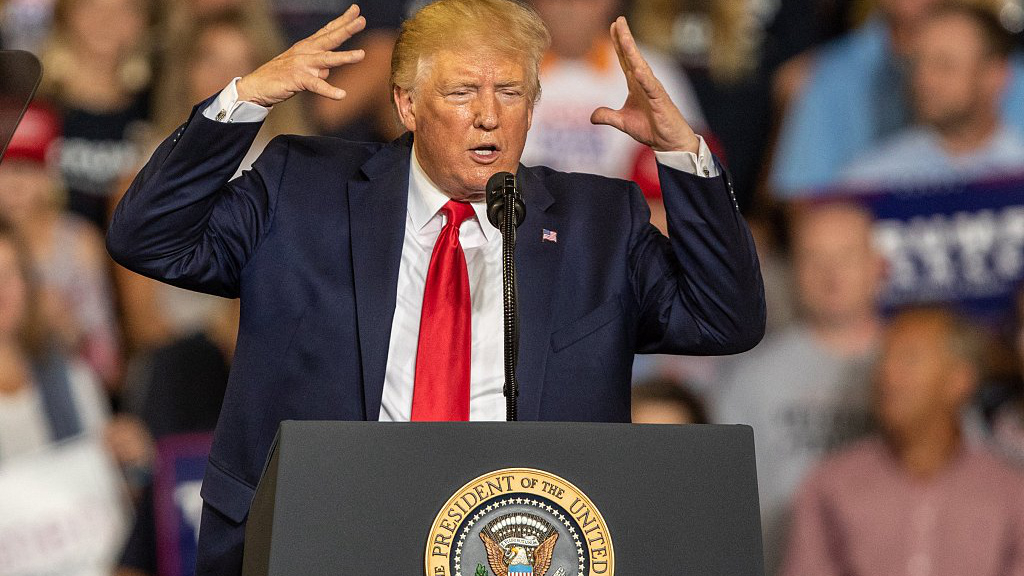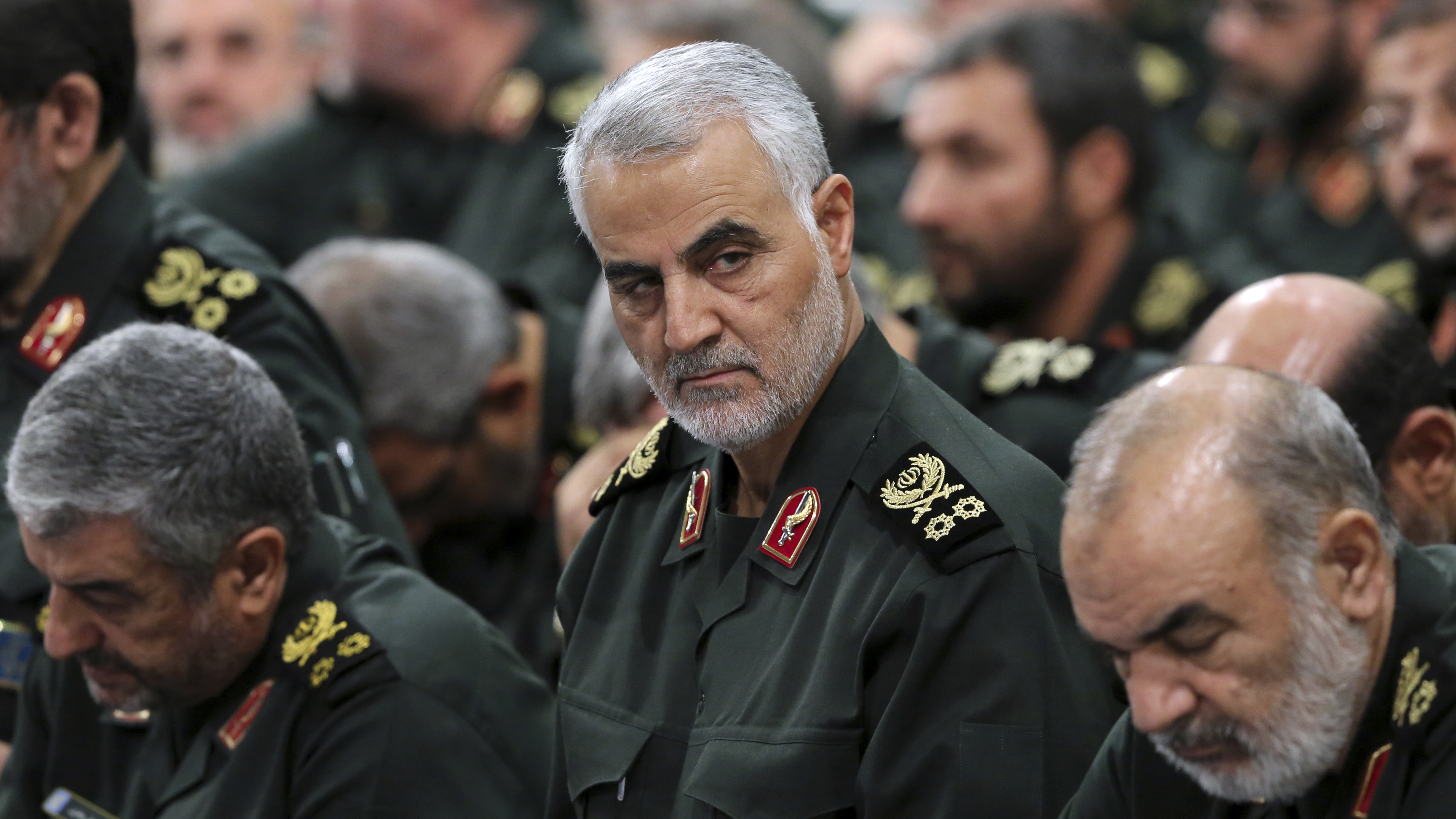
Editor's note: Azhar Azam works in a private organization as a market and business analyst and writes about geopolitical issues and regional conflicts. The article reflects the author's opinions and not necessarily the views of CGTN.
Being the biggest economy and purportedly the predominant military might of the world, the international community expects the U.S. to add thrust to the global economy, utilize its universal influence positively to resolve regional conflicts, and make an important contribution for the peace and stability the world over.
Unfortunately, the U.S. has completely loathed behaving like a dynamic and responsible state and blinded by power and rage, has continued to perversely rattle the global peace efforts by its provocative and threatening tones and aggression on the weaker nations in the name of securing American lives and national security interests.
The history echoed as after killing Qasem Soliemani, head of the Quds Force, in a drone strike, U.S. President Donald Trump accused him of "plotting imminent and sinister attacks on American diplomats and military personnel" while parroting the same hoary claim that Soliemani had targeted, injured and murdered hundreds of American civilians and servicemen.
By assassinating the Iranian top military leadership, Washington is ostensibly preparing to reenter into the Middle East, from where it had formerly gestured to pull out. Though Trump murmurs that he does not want a change of government or war with Tehran, the deployment of thousands of additional troops in the Persian Gulf nullifies his contentions. The U.S. had hitherto invaded Iraq twice to make the Baghdad its strong foothold in the region and is now again baiting the impoverished nation for its sham strategic goals.
Unlike previously, when Washington used to employ such tactics of attacking sovereign countries and killing their leadership to legitimize its hostility and forge multilateral military alliances – this time, nations across the globe rebuffed to buy the U.S. impression of misconception about Iran.
Trump's adverse action has been strongly disapproved by the international world as a whole and even by the U.S. allies and domestic American political gurus and congressmen. While Iraq considered the step as "aggression" – China, France, Germany, Russia, Turkey, the UK, and others showed a very serene and objective approach and urged the sides, the U.S. in particular, to exercise restraint that could otherwise entail grave consequences for regional peace and stability.
Americans, who were one-voiced on September 11, are now slating Trump for not taking the Congress on board for an airstrike in Iraq. Following the statement about Trump administration's "provocative, escalatory and disproportionate military engagement" that put American citizens, military personnel and allies in danger – the White House Speaker Nancy Pelosi said the House will "introduce and vote on a War Powers Resolution to limit the President's military actions regarding Iran."

The late Major General Qasem Soleimani, commander of Iran's Quds Force, was killed in a U.S. airstrike. /AP Photo
The late Major General Qasem Soleimani, commander of Iran's Quds Force, was killed in a U.S. airstrike. /AP Photo
Trump's rival presidential candidate Senator Bernie Sanders urged Congress to reassert its constitutional responsibility for war while and furious Senator Chuck Schumer endorsed Sanders and planned "to fight him (Trump) tooth and nail" on starting an endless war. Many Americans also took to the streets to denounce the strike.
The U.S. military conducted the operation in Baghdad so covertly that even its closest ally the UK, which has 400 troops in the Middle East to work alongside the U.S., and Prime Minister Boris Johnson, were out of the loop as well.
Pompeo made such an effort to influence Pakistan and phoned the country's army chief General Qamar Javed Bajwa presumably to seek Islamabad support. But Pakistani military head emphasis on maximum restraint and de-escalation as well as the assurance "We will not allow our soil to be used against anyone" blow up the U.S. intent to inflict disturbance in the Middle East.
In a telephonic conversation with Iranian foreign minister Javad Zarif, Chinese State Councilor and Foreign Minister Wang Yi termed the U.S. act a "military adventurism" that goes against international relations. He pressed Washington to pursue the process of dialogue and asserted that China is ready to play a constructive role for peace and stability in Western Asia.
China has also backed Iran's Hormuz Peace Endeavor that is furthered by Tehran as an important forum of dialogue and political negotiations among the region's nations based on no use of force, settling crisis peacefully, respect each other's sovereignty and non-interference in internal affairs of other countries.
But all the fused international voices of peace negotiations and restraint seem to have no impact on the U.S. as Trump continues to escalate the situation and push the region into yet another bloody war. After bragging about two trillion dollars of military equipment acquisitions, Trump issued a "legal notice" that the U.S. would strike back in case of any Iranian reprisal, "perhaps in a disproportionate manner."
As opposed to putting itself accountable to the international community on its uncalled-for offensive, the U.S. haughty attitude is greatly brazen and deplorable. While it should be using the global diplomatic forums to ease the tensions with Iran, it is trying to create a more critical mess in the conceit of its military prowess and hegemonic posture.
9/11 terrorist attacks on the U.S. were indubitably the horrific incidence, so the global community fiercely condemned the incursions in unison and unanimously backed the U.S. war on terror. But this time, the U.S. is the aggressor – not a victim – which deliberately ripped up the international laws, violated the sovereignty of an independent country, and exterminated a serving Iranian army general, therefore is finding virtually no ally to rationalize its drone strike in Iraq.
(If you want to contribute and have specific expertise, please contact us at opinions@cgtn.com.)